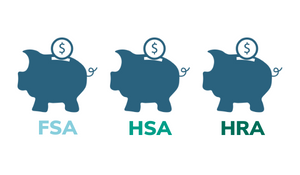Which Spending Accounts Can I Use Together?

There are three main supplemental options that can be used to pay for qualified health care expenses: a Flexible Spending Account (FSA), a Health Reimbursement Arrangement (HRA) and a Health Spending Account (HSA). If you are lucky enough to be offered more than one option by your employer, there are restrictions you’ll need to consider, depending on the combination in question. Here are which products you can take advantage of at the same time, and which you cannot.
FSA+HRA
You can use a health care FSA and an HRA together. To avoid forfeiting funds from an FSA, which don’t automatically carry over to the next year, expenses should come from that account first, if allowed by your employer. (However, an employer may elect to allow money in your FSA to carry over up to $570 two and a half months into the next year.) Money from the HRA could then be used to cover other qualified medical expenses once the money from the FSA is exhausted. Note that the same expenses cannot be reimbursed from both accounts.
FSA+HSA
The answer to this is yes and no. You generally cannot contribute to both an HSA and an FSA because an FSA is considered “other health coverage” by the IRS. And to have an HSA, you must have a High-Deductible Health Plan. However, there are two exceptions: a Limited-Purpose FSA that only covers certain expenses, such as dental and vision costs, and a Dependent Care FSA (DCFSA). These are sometimes referred to as an “HSA-compatible FSA.”
Like a health FSA, the maximum annual contribution is the same for a Limited-Purpose FSA ($2,850 in 2022). Likewise, a Limited-Purpose FSA may also have a $570 maximum carryover, depending on the employer’s plan.
Here are some things that a Limited-Purpose FSA covers:
Dental: Dental plan deductibles, copays and co-insurance; cleanings; exams and diagnostic services; bridges, crowns, dentures and fillings; implants; root canals; and X-rays
Vision: Vision plan deductibles, copays and co-insurance; eye exams; eye surgery, including LASIK; eyeglasses and contact lenses; eyeglass repair kits; prescription sunglasses
HRA+HSA
If you participate in an HRA, you are not eligible to contribute to an HSA … unless your employer offers an HRA that only covers dental, vision and specific over-the-counter items. In that case, you can participate in an HRA and contribute to an HSA.
If you have an HSA but do not make contributions, it doesn’t change your HRA eligibility. FSA and HRA status affect HSA eligibility, not the other way around.
Your employer may also offer a different HSA-compatible HRA, such as one that does not start working until you have met the deductible required under your HSA. Here are the four types of HRAs that are compatible with an HSA:
- Limited Purpose HRA: (as mentioned above): Pays or reimburses only vision and dental, permitted insurance or preventive care. These expenses do not count toward the HDHP deductible.
- Post-deductible HRA: Pays or reimburses only for preventive care or medical expenses that are incurred after the minimum annual HDHP deductible is met
- Retirement HRA: This covers eligible expenses only after retirement. Until retirement, an HSA can be used to cover expenses. HSA eligibility is lost after retirement and switches to the HRA.
- Suspended HRA: You suspend your HRA by electing to forgo reimbursement or payment for medical expenses incurred during the coverage period. This must be done before HRA coverage begins. During the suspension, the person is HSA-eligible. The suspension does not apply to expenses that are permitted insurance, permitted coverage, or preventive care.
Because each situation comes with specific limitations, it’s best to check with the plan administrator at your company about the nuances of supplemental health care options that are available to you.


Share Your Thoughts